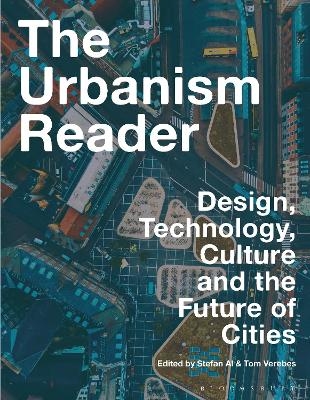
The Urbanism Reader
Bloomsbury Visual Arts (Verlag)
978-1-350-37790-5 (ISBN)
- Noch nicht erschienen (ca. Februar 2025)
- Versandkostenfrei innerhalb Deutschlands
- Auch auf Rechnung
- Verfügbarkeit in der Filiale vor Ort prüfen
- Artikel merken
The selection of readings presented here is uniquely tailored to a design perspective for architects and urban designers – balancing social issues in urbanism with a clear focus on foregrounding design as an instrument for change in cities, and examining the outcomes and challenges of recent design theories, design methods, and technologies in the built urban environment.
Covering today’s most urgent issues, 45 texts explore key topics in urbanism – from digital design technologies to smart cities, from the ongoing ecological crisis to public health and the impact of Covid-19, and from emergence and informality to economic inequity in global cities. Chapters cover cultural issues including diversity, indigenous knowledge, decolonization, social justice, and inclusion alongside technological developments, while a final chapter speculates on the future of urbanism through readings in AI, virtual reality, and the frontiers of current thinking in architecture and urban design.
The extracts are grouped by theme, each with an introduction to the historical contexts and guiding paradigms – helping design students, researchers, and professionals to make sense of the diverse field of theory and practice in the past, present, and future of global urbanism.
Stefan Al is an architect, urban designer and author, and Associate Professor of Urban Policy and Planning at Hunter College, City University of New York, USA. His previous books include The Strip: Las Vegas and the Architecture of the American Dream which was a Wall Street Journal “best book to read” and Beyond Mobility: Planning Cities for People and Places which won the 2019 National Urban Design Award. Tom Verebes is Tenured Professor in the School of Architecture and Design at the New York Institute of Technology, USA, and Director of OCEAN CN, based in New York. He is the author of over 150 books, chapters, articles and project features.
List of Figures
Introduction
Chapter 1: Spatial Heterogeneity, Diversity and Difference After Modernist Planning
Robert Venturi and Denise Scott Brown - Learning from Las Vegas: The Forgotten Symbolism of Architectural Form
Colin Rowe and Fred Koetter -Collage City
Kenneth Frampton - Modern Architecture: A Critical History
Chapter 2: Urbanism and Models of Design Complexity
Christopher Alexander - "The City is Not a Tree"
Manuel De Landa - A Thousand Years of Nonlinear History
Jeffrey Kipnis - Folding in Architecture
Stan Allen - Architecture After Geometry
Peter Eisenman - Diagram Diaries
Sanford Kwinter -Far from Equilibrium: Essays on Technology and Design Culture.
Chapter 3: Intensities, Flows, Connectivity, and Networked Urbanism
Frei Otto - Occupying and Connecting: Thoughts on Territories and Spheres of Influence with Particular Reference to Human Settlement
Michael Weinstock - The Architecture of Emergence: The Evolution of Form in Nature and Civilisation
Manuel Castells - The Rise of the Network Society: The Information Age: Economy, Society, and Culture
Jonathan D. Solomon - Shaping the City: Studies in History, Theory and Urban Design
Michael Kubo, Farshid Moussavi, and Alejandro Zaera Polo - The Yokohama Project
Chapter 4: Density, the Compact City and Metropolitan Culture
Richard Rogers - Cities for a Small Planet
Rem Koolhaas - "The Future's Past"
Winy Maas - “Datascape: The Final Extravaganza”
Chapter 5: Ecology, Resilience, and Green Infrastructure
Anne Whiston Spirn - The Granite Garden
Charles Waldheim - The Landscape Urbanism Reader
Kongjian Yu - "Beautiful Big Feet: Toward a New Landscape Aesthetic"
Watson, J., H. Abukhodair, N. A. Naeema Ali, A. Robertson, H. Issaoui, and C. Sun - "Design by Radical Indigenism: Equitable Underwater & Intertidal Technologies of the Global South"
Chapter 6: Health, Equity, and Liveable Cities
Jan Gehl - Life Between Buildings: Using Public Space
Nicole Kalms - She City
Walter Hood and Grace Mitchell Tada - Black Landscapes Matter
Chapter 7: Emergent, Tactical, and Informal Urbanism
Ananya Roy - "Urban Informality: Toward an Epistemology of Planning"
Alfredo Brillembourg and Hubert Klumpner - "Rules of Engagement: Caracas and the Informal City"
Alejandro Aravena - "Elemental: A Do Tank"
Mike Lydon and Anthony Garcia - Tactical Urbanism
Chapter 8: Evolutionary, Computational, and Parametric Urbanism
Gordon Pask - “The Architectural Relevance of Cybernetics”
John Frazer - An Evolutionary Architecture
Tom Verebes - Masterplanning the Adaptive City: Computational Urbanism in the Twenty-first Century
Patrik Schumacher - The Autopoiesis of Architecture: A New Agenda for Architecture
Benjamin H. Bratton - "Parametricist Architecture Would Be a Good Idea"
Michael Batty - Cities and Complexity: Understanding Cities with Cellular Automata, Agent-Based Models, and Fractals
Chapter 9: Virtuality, Extended Realities, and the Metaverse
William J. Mitchell - Me++: The Cyborg Self and the Networked City
Carlo Ratti and Matthew Claudel - The City of Tomorrow: Sensors, Networks, Hackers, and the Future of Urban Life
Andrea Moneta - "Architecture, Heritage, and the Metaverse"
Chapter 10: Artificial Intelligence, the Internet of Things, and Technological Determinism
Areti Markopoulou - Learning Cities: Collective Intelligence in Urban Design
Neil Leach - Architecture in the Age of Artificial Intelligence: An Introduction to AI for Architects
Matias del Campo - Neural Architecture: Design and Artificial Intelligence
Kate Crawford - Atlas of AI: Power, Politics and the Planetary Costs of Artificial Intelligence
Bibliography
Index
| Erscheint lt. Verlag | 6.2.2025 |
|---|---|
| Zusatzinfo | 30 bw illus |
| Verlagsort | London |
| Sprache | englisch |
| Maße | 189 x 246 mm |
| Themenwelt | Naturwissenschaften ► Geowissenschaften ► Geografie / Kartografie |
| Technik ► Architektur | |
| ISBN-10 | 1-350-37790-2 / 1350377902 |
| ISBN-13 | 978-1-350-37790-5 / 9781350377905 |
| Zustand | Neuware |
| Informationen gemäß Produktsicherheitsverordnung (GPSR) | |
| Haben Sie eine Frage zum Produkt? |
aus dem Bereich


